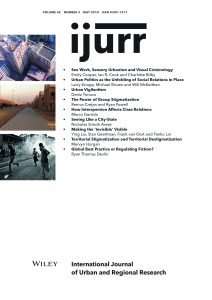Haram City is Egypt’s first ‘affordable’ gated community, hosting both aspirational middle‐class homeowners and resettled poor urban residents. Amidst legal ambiguity during Egypt’s 2011–2013 revolutionary period, the management team of this public–private partnership was tasked with creating a ‘fully self‐sufficient’ city. While Haram City is the product of top‐down ‘seeing like a state’ master planning (Scott, 1998), the day‐to‐day resolution of class vulnerabilities and disputes over ‘reasonableness’ in city life requires forms of interpersonal adjudication otherwise addressed through local urban law—‘seeing like a city’ (Valverde, 2011). This article uses ethnography of management techniques aiming to ‘upgrade behaviour’ to theorize that a private entity, in a strategically indeterminate relationship with the state, reconciles future‐oriented planning and storied prejudices by merging two visions of governance. Imitating the repertoire of urban law, managers plan the very realm of bottom‐up decision making. They then adapt top‐down urban planning to bottom‐up dispute resolution to spatially consolidate the ‘consensual’ outcomes of a rigged game. Evoking both colonial Egyptian vagrancy laws and neoliberal paternalist welfare, ‘seeing like a city‐state’ governance amounts to authoritarianism that conceals itself within custom, appearing neutral so as to plan streets, codes and inner lives at once.
Details
Written by:
Nicholas Simcik Arese
Digital Object Identifier (DOI)
10.1111/1468-2427.12601
About DOI

